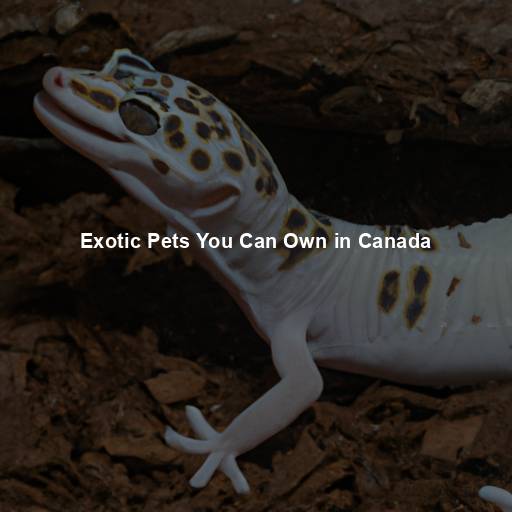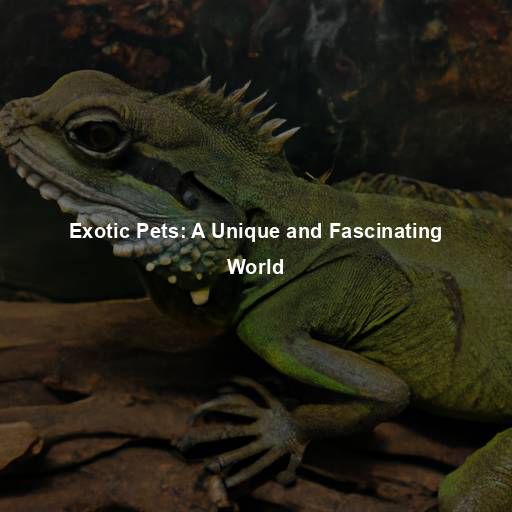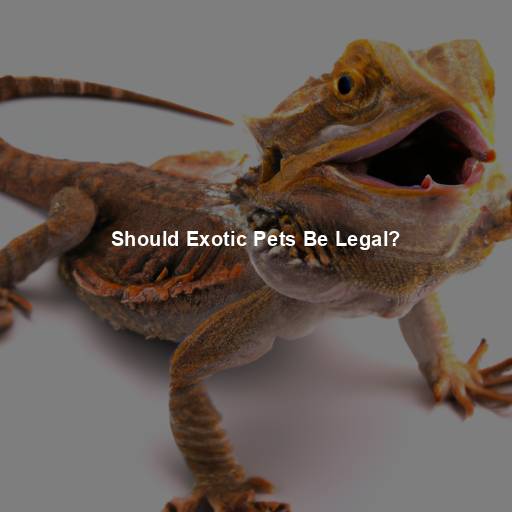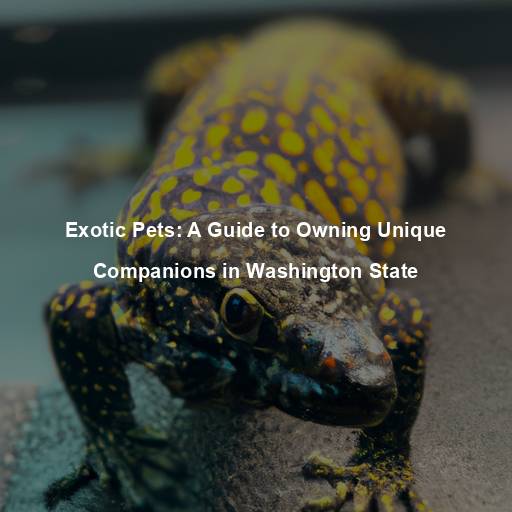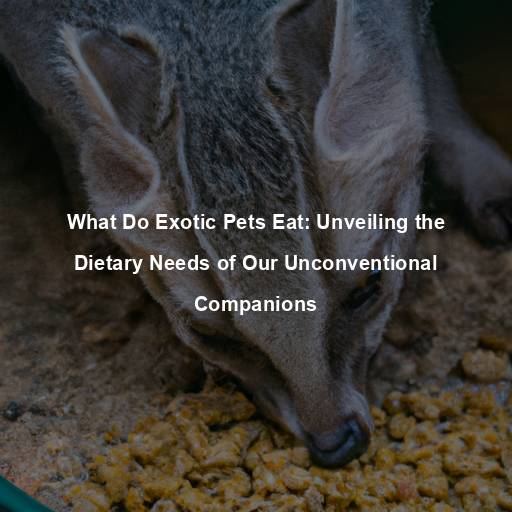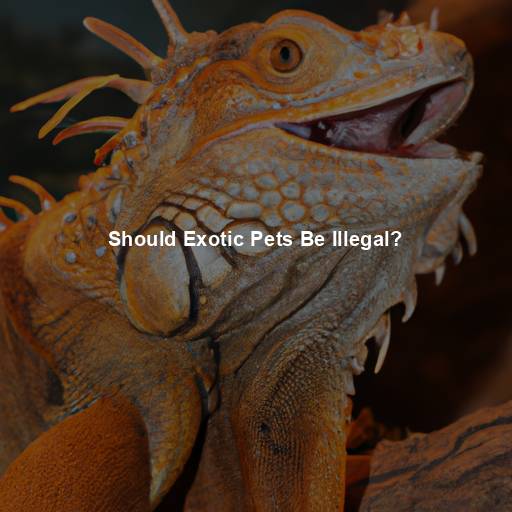Exotic Pets You Can Own in Canada
Last Updated on July 15, 2023 by Evan
Contents [hide]
- 1
- 2 Understanding Exotic Pets
- 3 Legal Considerations for Exotic Pet Ownership in Canada
- 4 Exotic Pets You Can Own in Canada
- 5 The Importance of Research and Responsible Ownership
- 6 Misconceptions about Exotic Pets
- 7 Ethical Considerations and Conservation Efforts
- 8 The Joy of Exotic Pet Ownership
- 9 FAQs: Exotic Pets You Can Own in Canada
- 9.1 Can I own an exotic pet in Canada?
- 9.2 What are some commonly owned exotic pets in Canada?
- 9.3 Are there any restrictions on owning exotic pets in Canada?
- 9.4 Do I need a permit or license to own an exotic pet in Canada?
- 9.5 Are there any special accommodations needed for exotic pets in Canada?
- 9.6 Can I import an exotic pet into Canada?
- 9.7 What should I consider before owning an exotic pet in Canada?
Canada is known for its diverse wildlife, but what about owning exotic pets? Many individuals are drawn to the allure of owning a unique and exotic creature as a pet. However, it’s essential to understand the laws and regulations surrounding exotic pet ownership in Canada. In this article, we will explore the fascinating world of exotic pets and uncover the species that are legally allowed to be owned in Canada.
Understanding Exotic Pets
Defining Exotic Pets
Exotic pets are non-native animals that are not commonly kept as pets. These creatures often come from different regions and have unique needs and characteristics. From reptiles and amphibians to birds and small mammals, the world of exotic pets offers a wide range of options for those seeking a distinctive companion.
Responsible Exotic Pet Ownership
Owning an exotic pet comes with great responsibility. It is crucial to consider the specific needs of the animal and provide a suitable environment to ensure their well-being. Additionally, understanding the legal requirements and obtaining proper permits is essential to ensure compliance with Canadian laws related to exotic pet ownership.
Legal Considerations for Exotic Pet Ownership in Canada
The Canadian Wildlife Act
The Canadian Wildlife Act is a federal legislation that protects certain species and regulates their possession. It is crucial to familiarize oneself with this act and its provisions to ensure compliance when considering owning an exotic pet in Canada.
Provincial and Territorial Regulations
In addition to federal laws, each province and territory in Canada may have its own regulations regarding exotic pet ownership. It is important to research and understand the specific rules in your area before acquiring an exotic pet.
Exotic Pets You Can Own in Canada
Reptiles
Reptiles are fascinating creatures that captivate the hearts of many pet enthusiasts. In Canada, several reptile species can be legally owned as pets. Some popular choices include:
-
Ball Python (Python regius): Known for their docile nature and beautiful patterns, ball pythons make excellent reptile companions.
-
Leopard Gecko (Eublepharis macularius): These small, nocturnal lizards are relatively easy to care for and are a popular choice among reptile enthusiasts.
-
Red-Eared Slider (Trachemys scripta elegans): With their vibrant red “ears,” these turtles can be kept as pets in Canada, provided they were bred in captivity.
Birds
Birds are known for their stunning plumage and melodious songs. While numerous bird species are protected in Canada, there are still some exotic bird species that can be owned as pets, including:
The mesmerizing budgerigar, scientifically known as Melopsittacus undulatus, captivates all with its vibrant feathers and delightful demeanor. Commonly referred to as budgies or parakeets, these charming creatures have irresistibly playful personalities that make them a favorite choice as pets. Their tiny size and kaleidoscopic colors create a burst of joy in any home, leaving one puzzled by their captivating beauty.
- Cockatiel (Nymphicus hollandicus): With their charming crests and friendly demeanor, cockatiels make delightful companions for bird enthusiasts.
The Green-Cheeked Conure, scientifically known as Pyrrhura molinae, is a delightful avian species that captivates bird enthusiasts with its exquisitely colorful feathers and lively demeanor. These charming little parrots have gained immense popularity among pet owners for their engaging and playful personalities. With their vibrant plumage and mischievous antics, Green-Cheeked Conures are sure to bring endless joy and companionship to any bird lover’s life.
Small Mammals
Small mammals can bring joy and companionship to many Canadians. While domesticated cats and dogs are the most common pets, there are some exotic small mammal species that can be legally owned:
Introducing the captivating Sugar Glider (Petaurus breviceps)! These enigmatic, pint-sized marsupials possess an extraordinary talent for gliding through the night sky, leaving us mesmerized by their graceful maneuvers. It’s no wonder they have become a popular choice for those seeking an extraordinary companion, showcasing their unparalleled character and distinctive behaviors. Discover the alluring world of the Sugar Glider and prepare to be enchanted by their bewildering charm.
Have you ever considered the mesmerizing world of African Pygmy Hedgehogs? These enchanting creatures have captivated the hearts of exotic pet enthusiasts, ushering in a new era of admiration. With their tiny frames adorned by a spikey coat, they demand special attention and care, but oh, the rewards they offer! Developing deep and heartfelt connections with their dedicated owners, these pint-sized companions are more than just pets – they become cherished members of the family.
Did you know that ferrets, those mischievous little creatures, may not be native to Canada, but they are legally allowed as pets in certain provinces? With their playful nature and insatiable curiosity, they bring a burst of energy to any household. However, it’s important to note that these lively companions require dedicated care to truly flourish in their new environments.
The Importance of Research and Responsible Ownership
Educating Yourself
Embarking upon the path of pet ownership, particularly when delving into the realm of exotic creatures, demands an all-encompassing expedition into the vast depths of knowledge. Becoming a connoisseur of the species that beckons to you is of utmost importance – a thorough exploration of their native abode, their tantalizing appetite, the hidden intricacies of their social dynamics, and the enigmatic labyrinth of health-related enigmas they may bring. Without this profound wisdom, the harmonious symbiosis between you and your newfound exotic companion may waver, teetering on the precipice of a fragmented existence.
Finding Reputable Breeders and Sellers
When embarking on the exciting journey of welcoming an exotic pet into your life, it is imperative to tread the path of ethical consumerism. Seek out trusted and caring breeders or sellers who genuinely prioritize the well-being of these unique creatures. It is vital to steer clear of the treacherous realm of illegal and unethical sources, such as the notorious exotic pet trade, which not only exacerbates the decline of wildlife populations but also fuels unsustainable practices that baffle the mind.
Providing Proper Care and Enrichment
Exotic pets have unique needs that must be met to ensure their well-being. This includes providing appropriate housing, a balanced diet, regular veterinary care, and mental stimulation. It is essential to dedicate time, effort, and resources to meet these requirements and provide a fulfilling life for your exotic pet.
Commitment and Dedication
Deciding to welcome an exotic pet into your home is not a decision to be taken lightly. The journey of caring for these extraordinary creatures is a path filled with unexpected twists and turns. Devoting yourself to their needs is an ongoing commitment that requires thoughtful consideration of their distinctive demands, from creating an environment tailored specifically to their requirements to meticulously ensuring their dietary and medical needs are met, over the course of their entire existence.
Financial Considerations
Exotic pets can come with significant financial costs. From the initial purchase or adoption fees to ongoing expenses such as food, housing, veterinary care, and enrichment, it is essential to budget for the financial responsibilities associated with owning an exotic pet. Additionally, consider unexpected expenses that may arise, such as emergency veterinary care or specialized equipment.
Legal and Ethical Considerations
Responsible exotic pet ownership goes hand in hand with understanding and complying with the laws and regulations surrounding these animals. It is crucial to stay updated on any changes in legislation and obtain the necessary permits or licenses required for owning an exotic pet. Moreover, ethical considerations should be taken into account, such as supporting conservation efforts and avoiding the purchase or possession of endangered species.
Misconceptions about Exotic Pets
Exotic Pets as Status Symbols
One common misconception is that owning an exotic pet is a way to showcase wealth or status. However, it is essential to remember that exotic pets are living beings with specific needs and not mere accessories. The decision to own an exotic pet should be driven by a genuine interest in the species and a commitment to providing them with a suitable and enriching life.
Exotic Pets as Low-Maintenance Pets
Another misconception is that exotic pets require less care and attention compared to traditional pets like cats or dogs. While it is true that different species have varying care requirements, the notion that exotic pets are low-maintenance is inaccurate. Exotic pets often have specialized dietary needs, environmental requirements, and socialization needs that must be met to ensure their well-being.
Exotic Pets as Playthings for Children
Exotic pets are not toys or playthings for children. It is crucial to recognize that these animals are living creatures with their own unique behaviors and instincts. They require gentle handling, supervision, and respect to ensure both the safety of the child and the well-being of the exotic pet. It is essential to educate children about responsible pet ownership and the specific needs of the species they interact with.
Ethical Considerations and Conservation Efforts
Supporting Conservation Organizations
As responsible exotic pet owners, it is essential to support conservation organizations that work towards the preservation and protection of wildlife and their habitats. By contributing to these organizations, individuals can help conserve the natural environments that many exotic pets originate from and support efforts to combat illegal wildlife trade and habitat destruction.
Responsible Breeding Practices
When it comes to bringing an extraordinary companion into your life, one must tread the path of discernment and prudence. A paramount factor in this quest is to rendezvous with trusted pioneers who champion the wellbeing and vitality of these magnificent creations. These dexterous caretakers instill a sense of belonging, cultivate meaningful connections, and champion the genetic mosaic, fostering a harmonious coexistence with our bewitching captives and averting the perils of plundering the wild.
Adoption and Rescue
When it comes to acquiring exotic pets, ethical options extend beyond responsible breeding. In fact, adoption and rescue organizations offer a rather perplexing yet compassionate approach. Many of these unique creatures find themselves in dire need of new homes, often due to unexpected twists of fate like changes in their owner’s circumstances or subpar care. By considering adoption or rescue, individuals not only get to provide these exotics with loving and caring environments but also play a crucial part in reducing the demand for wildlife-sourced animals- a true burst of humanity.
The Joy of Exotic Pet Ownership
Unique and Fascinating Companions
When it comes to the captivating realm of exotic pets, the rewards are simply unparalleled. These extraordinary creatures hold the power to inject our lives with an inexplicable sense of wonder and joy. From their mesmerizing behaviors to their stunning appearances, these unique companions serve as a constant source of awe and fascination. With their distinct personalities, they establish an unparalleled bond that goes beyond what words can adequately express.
Learning and Growth
Having an exotic pet is a one-of-a-kind journey that never ceases to amaze and challenge us. It’s not just about having a unique companion; it’s about diving into the fascinating realms of their natural history, behaviors, and specialized needs. As we immerse ourselves in this enchanting knowledge, we find ourselves in awe of the intricate wonders of the natural world, while simultaneously building a profound bond of compassion and duty towards these extraordinary beings.
The Bond Between Owner and Pet
When it comes to exotic pets, the bond they form with their owners is nothing short of extraordinary. The love and affection that blossoms from their unique companionship can leave us in awe. With their captivating charm and unwavering loyalty, these extraordinary creatures manage to fill our lives with immeasurable joy and unrivaled contentment. Their enchanting ways and special ability to understand us on a profound level make them the ultimate source of solace and happiness in our lives.
FAQs: Exotic Pets You Can Own in Canada
Can I own an exotic pet in Canada?
Have you ever wondered if you could add a touch of wild to your household in the Great White North? Well, the answer might surprise you! You see, owning an exotic pet in Canada is not entirely out of the realm of possibility, but, hold on tight, there’s a whirlwind of regulations and restrictions swirling around. Brace yourself, my friend, for a jigsaw puzzle of provincial and territorial laws, each one more perplexing than the last. So, before you embark on a wild adventure, make sure to dive deep into the research and uncover the tantalizing truth behind owning exotic pets in your neck of the woods. It’s a maze of curiosity worth exploring!
What are some commonly owned exotic pets in Canada?
Some commonly owned exotic pets in Canada include certain species of reptiles, such as ball pythons, bearded dragons, or leopard geckos. Small mammals like sugar gliders and hedgehogs are also popular choices. Additionally, some bird species like parrots and cockatiels may be considered exotic to some extent.
Are there any restrictions on owning exotic pets in Canada?
Yes, there are restrictions on owning exotic pets in Canada. The Canadian government and provinces have designated certain species as restricted or prohibited. These include large cats like lions, tigers, and cheetahs, as well as primates like monkeys. Endangered species and those listed under the Convention on International Trade in Endangered Species of Wild Fauna and Flora (CITES) are also strictly regulated.
Do I need a permit or license to own an exotic pet in Canada?
The need for a permit or license to own an exotic pet depends on the province or territory you live in and the type of exotic animal you wish to own. Some provinces require a permit or license for certain species, while others have a general ban on owning exotic pets. It is crucial to contact the appropriate authorities or wildlife agencies in your area to determine the specific requirements.
Are there any special accommodations needed for exotic pets in Canada?
When it comes to exotic pets, things can get quite intricate and bewildering. These fascinating creatures demand an array of specialized care and peculiar needs in order to thrive in captivity. From meticulously maintaining the ideal temperature and humidity levels to providing them with unique habitats, there’s no room for guessing games. Additionally, their diets and daily stimulation should mirror their wild counterparts. So, before bringing home an exotic pet, it’s crucial to delve into comprehensive research to guarantee you can meet their intricate requirements and provide a nurturing environment.
Can I import an exotic pet into Canada?
Importing exotic pets into Canada can be a complex process. The Canadian Food Inspection Agency (CFIA) regulates the importation of animals, including exotic pets, and has specific requirements to prevent the introduction of diseases. It is essential to contact the CFIA or consult with a reputable animal importer for guidance on the necessary permits, quarantine period, and any other import restrictions or regulations.
What should I consider before owning an exotic pet in Canada?
Before owning an exotic pet in Canada, it is important to consider several factors. Research the specific needs, lifespan, and behavior of the exotic pet you are interested in to ensure you can provide appropriate care. Understand the legal requirements and restrictions in your area and consider the long-term commitment involved in owning an exotic pet. Evaluate your lifestyle, available time, and financial resources to ensure you can meet the pet’s needs throughout its life. Additionally, it is crucial to consider potential challenges of owning an exotic pet, such as finding reliable veterinary care or appropriate socialization opportunities.

